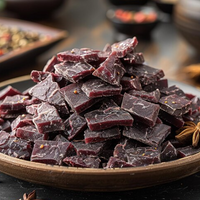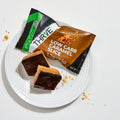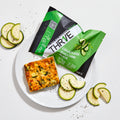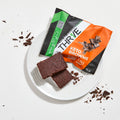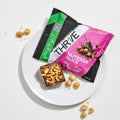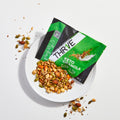Going keto and overhauling your diet can be a challenge. The good news is, you’re not alone! There’s a number of hurdles you might face when cutting down on carbs. Here are a few of the most common issues on the keto diet – and how to overcome them. Goodbye, brain fog!
 “I’m starving!”
“I’m starving!”
Firstly, check you’re eating enough fat. It might seem counter-intuitive to eat more fat while trying to lose fat – but it’s essential. Without carbs, fat is your main source of energy. Also, make sure you bump up the protein in your meals. “Both fat and protein contribute to food’s ability to initiate and maintain satiety,” explains THR1VE Nutritionist Shannon Young. “Making sure your meals contain adequate protein and fat will help eliminate hunger and create a prolonged sense of satisfaction.” Tip: if you’re still feeling hungry, double check your macronutrient and calorie targets to make sure you’re eating enough each day.
“I don’t have the energy to train.”
When transitioning to ketosis you might experience a dip in energy for the first week or so. However, it’s important not to skip training altogether. Just reduce training intensity – i.e. reduce the weight, time or effort. Moving more will actually give you energy. Also keep in mind your body will quickly transition to the ‘on tap’ energy source of stored body fat – a much more stable source than carbs. Ideal, right?
“I’ve got brain fog.”
It’s that fuzzy, vague, irritable mix that can set in while going keto. First step: check it isn’t dehydration. This is common when cutting carbs. “Over 70% of your body is composed of water and every function in the body is dependent on water, including the activities of the brain and nervous system,” Young explains. “Not consuming enough water can contribute to problems with focus, memory, brain fog and fatigue.” The target? Two litres a day, minimum. Extra if you’re exercising. Other ways to clear that fog include – once again – increasing your fat intake. “Your brain is mostly made up of fat and requires a steady supply of essentials fatty acids to run properly and smoothly,” says Young.
MCT oil can also help. Your brain can’t store energy, so it needs a constant supply that’s usually delivered by carbs. But when training your body to use fat for fuel instead, your liver breaks down body fat to produce ketones. “Ketones readily cross the blood-brain barrier to provide energy to the brain. When following a low-carb diet the medium chain fats in MCT oil raise blood levels of ketones, providing an instant energy source for your brain,” Young advises.
“I’m craving bread/sugar/chocolate…”
Ask yourself a couple of questions. Is it really the carbs your craving or is your body after something completely different? I.e. You may think your body is asking for sugar but is it really just dehydrated? “Another question to ask is, why do you think you want these foods?” says Young.
“Are you bored? Stressed? Tired? Just going for a short walk or de-stressing through an activity such as meditation can quickly eliminate these feelings. It will only take 4-5 days for your body to adapt to these changes and once it is no longer dependent on those sweet treats the cravings will become a lot less frequent.”
There’s light at the end of the tunnel!

 “I’m starving!”
“I’m starving!”